Representatives of countries from three different continents see the priorities for next year differently, but there are several that are common, namely, the fight against the pandemic, inflation and environmental protection.
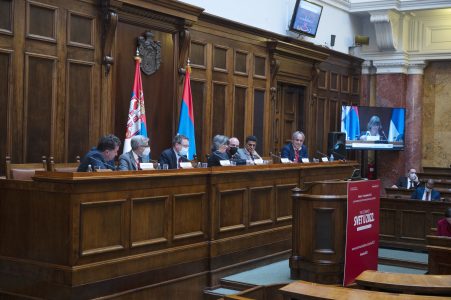
The first panel at The Economist: The World in 2022 conference focused on the prospects of the world order in the coming year. The ambassadors of Germany, Great Britain, Canada, France and Egypt spoke on this topic, as well as the acting Assistant Minister of Foreign Affairs. The panellists, who came from different parts of the world, had different views on inflation and the world economy, but also on climate change.
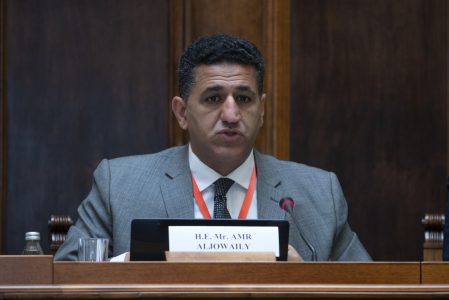
In regard to African issues and climate change, H.E. Amr Aljowaily, Ambassador of Egypt in Serbia, talked about the three most important aspects for the coming year. “It is important for Egypt to use all diplomatic relations to work on climate change in a multilateral way. Also, Egypt is important for the Common Market for Eastern and Southern Africa (COMESA), at which conference a month ago, a promise was made that this part of Africa will be built institutionally, which creates opportunities for Serbia, its companies and the entire Western Balkans. The third is the African continental free trade, which covers 1.2 trillion consumers. Egypt will play host to trade ministers from African countries next month, with the view of raising the institutional framework for improving trade.”
The African Continental Free Trade Area has two phases – one related to goods and services and the other to competition policy and intellectual property issues. Regarding the first phase, 90 percent of all customs barriers have been removed. In terms of services, five sectors have been liberalized, namely telecommunications, tourism, transport, financial and business services. It is very important to establish the rules of origin of goods, the Ambassador pointed out. Next year, African ministers will meet at a summit which will mark the completion of the first phase.
The Egyptian ambassador mentioned climate change, Agenda 27, Africa as the largest consumer market and COMESA as the most important topics for Serbia in 2022.
The Non-Aligned Movement’s, which was recently held in Belgrade, speaks volumes about Serbia’s strong ties with Latin America, Africa and Asia and has renewed 60 years of good relations, and presented a great opportunity for local companies, Ambassador Aljowaily explained. For developing countries, adaptation and financing will be most important aspects in terms of climate change, which is a great burden.
As for affordable direct flights between Africa and Serbia go, the ambassador pointed out that currently there are flights only between Belgrade and Cairo. He also mentioned climate change, Agenda 27, Africa as the largest consumer market and COMESA as the most important topics for Serbia in 2022.
At the beginning of his address, H.E. Thomas Schieb, the German Ambassador in Serbia, reminded that Germany has a new coalition government consisting of three political parties, but that the foreign policy of this country will continue to be focused on the EU and the Transatlantic Partnership, an order based on rules. 
“I believe that the EU will be the backbone of German foreign policy. It is important to learn lessons, especially from the ongoing pandemic, and of course, we must be realistic and know what is achievable and what is not in the current global political situation. Climate protection is one of the highest priorities for Germany for the years to come. We have a very ambitious plan to generate 70 percent of our energy consumption from renewable sources by 2030, which means a huge transition for our economy. Of course, Germany cannot do it alone. We know that the German carbon footprint rate is quite low, it stands at 2 percent, so we can set a good example and convince others to follow the same path, which includes Serbia,” the German ambassador explained.
Regarding inflation, he underlined that he is not an expert on the matter, but has been talking about this topic with experts, and that growing energy prices will be a decisive factor for inflation. The reason for that is the increase in demand from the industry, due to the strong recovery of the global economy after the pandemic. However, there is also a problem with delivery of gas from the North Sea, which has slowed down from time to time. Also, the increase in the share of renewable energy in total consumption may have contributed to that, as the use of wind energy declined early this year.
Germany’s vision is to make the EU more resilient and less dependent. The German ambassador expressed his desire for the country to increase its capacities, which is not easy and cannot be done overnight. Still, Germany is convinced that it is going in the right direction. The idea is to adopt the European course next year, and as far as enlargement is concerned, he pointed out the opening of cluster 4, which should encourage Serbian authorities to continue their efforts.
H.E. Sian MacLeod, the British ambassador, underlined that 2021 was not easy and that the current difficulties will continue next year. “There have been so many challenges, but I want to highlight three – COVID, climate and conflict. The pandemic is still at the top of all priorities in terms of consequences for people and the pressure on healthcare systems, appropriate measures, the pressure on society and the economy, and especially on education. Also, emergence of new COVID strains should not be forgotten.
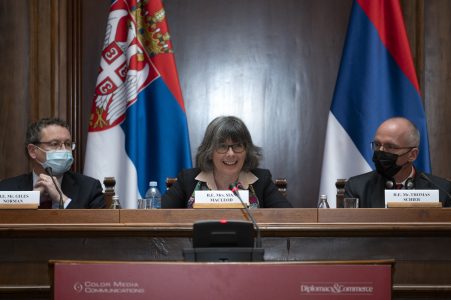
“Living in Belgrade, we were reminded of extreme weather conditions, climate change, difficulties in forecasting and preparing for changing weather every day. Although, we have not heard much about this topic today, conflicts in many continents pose great challenges. People suffer in various situations, even in Europe, as they are facing many difficulties and threats.
I would like to add a fourth challenge to this mix and that is respecting human rights and democracy. We have seen deterioration in many parts of the world regarding this issue, and it must remain a priority for next year. There was also good news – Serbia had an impressive vaccination rollout. There are still difficulties, but scientists have done a fantastic job when it comes to vaccines. There is also good news about the development of malaria vaccines.”
She also spoke about the idea that the Prime Minister of the United Kingdom, Boris Johnson, is talking about, and that is uniformity. According to her, this refers to the system decentralization, both in terms of economic development and education. The British ambassador also stated that in some countries, even the seat of the government has been moving from city to city. However, this cannot be done overnight.
Ambassador MacLeod also highlighted Britain’s quick recovery country from the crisis caused by the pandemic, adding that they hope that the country’s inflation will be reduced to two percent. As she explained, the Green Agenda creates opportunities across the country and that the wind on the shores of the high seas is one of the largest sources of energy in Britain, hence several power plants are located there.
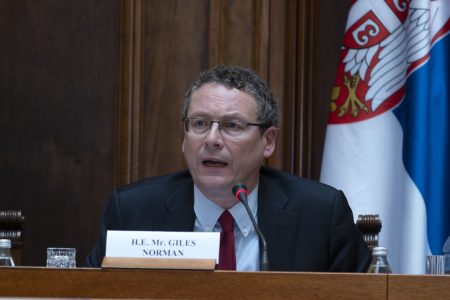
Canadian Ambassador in Serbia, H.E. Giles Norman, said that his country is looking forward to 2022, but that insecurity will be its trademark. He also said that that is inevitable in terms of health, economy, inflation, energy, climate change, but also geopolitical uncertainty.
“We will face all this during 2022, just like before. All these uncertainties will begin with a very difficult winter and crisis. They will manifest in various forms, through street riots, the pursuit of simplified solutions, the use of hate speech and other crude behaviours. There will be an even greater increase in frustration, so our governments must work both nationally and internationally to reduce uncertainty, but also to restore shaky trust and faith in governments, which is not very strong at the moment. The challenge we have is to restore and rebuild that trust as national and international communities, which is possible through dialogue and understanding global challenges, all of which require cooperation. I call for this dialogue to take place in institutions in which we have demonstrated that we can work together.”
He added that nothing was perfect, but that it is better to fix things than to create them from the beginning. He also commended the miracle that are vaccines, which validate that cooperation with science and making reasonable decisions is the solution to get out of this situation. He also pointed out the importance of the events ahead of us, from the Winter Olympics, the elections in France and the United States and the upcoming NATO summit. There will be other issues that will mark next year, such as those in Ukraine or Tehran.
The Ambassador of Canada added that 2022 definitely won’t be boring as it will be rife with uncertainty and that it is better to be optimistic than cynical in this unlikeable year
The Ambassador of Canada added that “2022 definitely won’t be boring as it will be rife with uncertainty”. He also said that he is optimistic and believes that it is better to be optimistic than cynical in this unlikeable year.
When asked about the race between China and America, he said that Canada wants stable and good relations with both countries, adding that the country does not want to see a bipolar world.
As for the multicultural society, the Government of Canada has committed to accepting 400,000 migrants as this is a fundamental part of Canadian politics. Canada has been shaped by migrants since it’s the country’s inception, so that’s nothing new, he explained.
At the beginning of his address H.E. Pierre Cochard, the French ambassador, underlined the importance of elections in his country. According to him, in the first six months of next year, France’s presidency of the Council of Europe will be very important for the country and it will have implications for both Europe and Serbia.
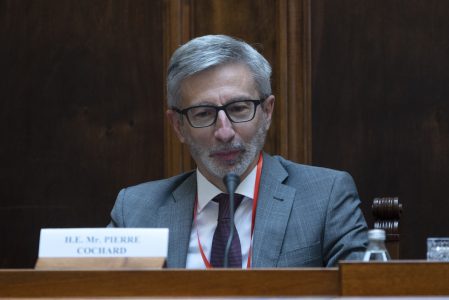
“Not only will the French presidency shape some new projects for the EU, but we will work with other members and institutions to find positive compromises when disagreements arise, which happens from time to time among the EU Member States. We want to have a sovereignty plan, and at the same time, we will be committed to our vision of a world order based on the rule of law, respect for democracy and minorities. We intend to protect our border more strongly than before, while respecting our obligations regarding the protection of refugees and asylum seekers. We are working even harder to ensure the safety of all our citizens. I must pay tribute to Serbia, which is a strong partner in that area, which participates in several missions together with other EU countries. We will pay more attention to our neighbourhood, because cooperation between Europe and Africa is the key to our common security and prosperity.
Recovery is another important priority. Several countries have managed to avoid bankruptcy thanks to French investments. Serbia, as an EU candidate, has opened a new cluster, and that is very encouraging news regarding the country’s EU accession process. The cluster relates to energy and environmental protection. Last but not least, there is the sense of belonging that we want to develop in the EU and our neighbourhood, as we defend our values. We want to be firm in our principles, help democracy, facilitate media freedom and protect human rights everywhere. These are all ambitious priorities, but we will do our best together with the other members to go in that direction.”
The French ambassador also mentioned the need to reform the decision-making process in order to be more effective. A novelty in the EU compared to previous years, when there was euphoria about the enlargement, the Union is now reviewing its internal values. The ambassador said that the history and peace that the EU managed to maintain should not be questioned and underlined that the EU is a union of sovereign countries.

Nebojša Košutić, Acting Assistant of the Serbian Minister of Foreign Affairs and Head of the EU Sector at the Foreign Ministry, spoke about Serbia’s goals in terms of foreign policy, primarily regarding the EU accession and regional policy. “We are very interested in the Open Balkans initiative, but we want to be a part of all developments in our region. We hope that other regional partners will have the same ambition. What particularly excites us is the opening of the No. 4, which deals with environmental protection (Chapter 27). This will lead to a few discussions about what kind of energy policy we should follow. We need to find a common theme and which energy sources are acceptable and which are not, especially when it comes to nuclear energy. We need a clear line of action.”
According to him, Serbia has difficulties in finding its place in the world, but it must find it in the community of nations with regional integrations. Serbia sees that the EU projecting its economic interest worldwide. Mr Košutić also reminded that investing in pacifism or Africa does not mean that we should forget our neighbouring countries, i.e. the Western Balkans, which should not be treated as “a black hole” surrounded by EU Member States. He also stated that those countries have migrants, energy, and a climate that cannot be isolated from the rest of the world.